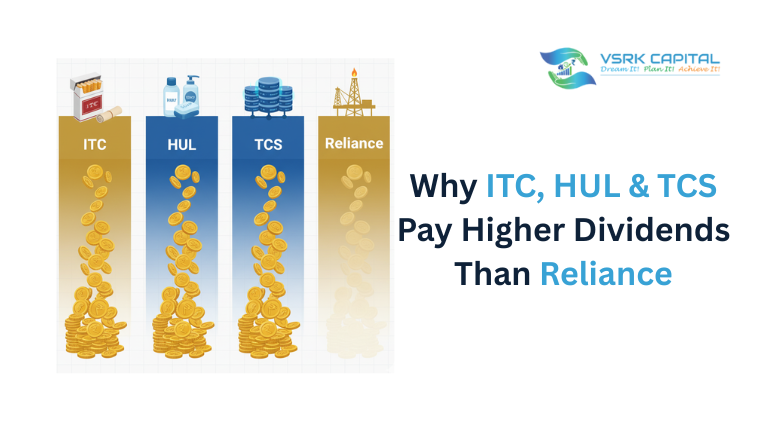In India’s stock market, some names stand out as high dividend paying stocks — companies like ITC, HUL, and TCS are often cited. But giants like Reliance rarely compete in the same way when it comes to dividend payouts. Why is that?
In this article, we’ll explore ITC HUL TCS vs Reliance, look at the dynamics of mature companies’ dividends, dividend vs growth stocks, dividend payout ratio India, and much more.
1. Dividend Stocks India — The Big Picture
When investors look for stable income from equities, they often turn to dividend stocks India. These are typically well-established companies with predictable cash flows.
- High dividend paying stocks like ITC, HUL, and TCS distribute a large portion of profits to shareholders.
- Reliance, on the other hand, focuses on expansion, diversification, and growth—reinvesting profits rather than distributing them.
This difference reflects business maturity, capital requirements, and each company’s growth strategy.
2. Why Mature Companies Pay Higher Dividends
A. Limited Growth Opportunities
ITC, HUL, and TCS operate in mature markets where growth is steady but limited. Once expansion stabilizes, they prefer to reward shareholders with dividends rather than hoarding cash.
Reliance, in contrast, is still aggressively growing across telecom, retail, and energy, so it needs to reinvest profits.
B. Stable and Predictable Cash Flows
Mature companies have consistent revenue streams, allowing them to maintain high dividend payout ratios.
Reliance’s cash flows are more volatile due to large-scale capital projects and market fluctuations.
C. Attracting Income-Focused Investors
High dividend payouts help attract investors seeking regular income. These companies use dividends as a signal of financial stability and confidence in future earnings.
D. Efficient Use of Capital
If reinvestment opportunities are limited, distributing profits as dividends ensures efficient capital allocation and enhances shareholder trust.
E. Tax and Regulatory Factors
Post-abolition of Dividend Distribution Tax (DDT), dividends are now taxed at the investor’s slab rate. Despite this, many mature firms continue rewarding shareholders with regular dividends.
3. Dividend vs Growth Stocks — Key Differences
| Aspect | Dividend Stocks (ITC, HUL, TCS) | Growth Stocks (Reliance) |
| Profit Use | Shared with shareholders as dividends | Reinvested for expansion |
| Investor Type | Income-seeking, conservative | Growth-focused, risk-tolerant |
| Volatility | Lower | Higher |
| Returns Type | Regular income + moderate appreciation | High capital appreciation potential |
4. Dividend Payout Ratio Trends in India (2025)
- The dividend payout ratio measures how much of net profit is paid out as dividends.
- ITC, HUL, and TCS maintain consistently high payout ratios, often above 70%.
- Reliance, however, keeps its ratio lower to fund new ventures.
- These trends reflect the balance between growth ambition and shareholder reward.
In Indian dividend stocks 2025, ITC, HUL, and TCS remain among the top dividend paying companies in India.
5. Real-World Dividend Examples
- ITC Dividend 2025: Continues to offer a steady and generous payout supported by cash-rich operations.
- HUL Dividend 2025: Consistent growth in both profit and dividend per share, maintaining investor confidence.
- TCS Dividend 2025: Declared multiple interim and final dividends, reflecting strong free cash flow.
- Reliance Dividend 2025: A modest payout, showing its focus on reinvestment and long-term growth strategy.
6. Why Companies Choose to Pay Dividends
- To reward shareholders and build loyalty
- To signal financial health and profitability
- To attract conservative or income investors
- To maintain efficient use of cash reserves
- To stabilize stock value through consistent returns
Conclusion
According to VSRK Capital, smart investing is about balancing growth with stability. The firm emphasizes a disciplined, goal-based approach to wealth creation — focusing on businesses that combine strong fundamentals with consistent returns.
From their perspective:
- ITC, HUL, and TCS are mature, stable companies ideal for investors seeking steady income.
- Reliance, though less focused on dividends, offers long-term capital appreciation due to its growth potential.
- VSRK recommends a balanced portfolio containing both dividend and growth stocks, customized to individual goals and risk profiles.
Thus, while Reliance reinvests for expansion, ITC, HUL, and TCS prioritize rewarding shareholders — both strategies having unique benefits for different investor types.
FAQs
Because they are mature businesses with steady cash flows and fewer reinvestment needs, allowing them to return more profits to shareholders.
It’s the percentage of net profit a company distributes as dividends. Mature companies like HUL, TCS, and ITC usually have higher payout ratios.
It depends on your investment goal. Dividend stocks suit investors seeking income, while growth stocks fit those focused on long-term capital appreciation.
Reliance prefers to reinvest profits into expanding its businesses—energy, retail, and telecom—to drive future growth.
Companies like ITC, HUL, TCS, Coal India, and Power Grid are among India’s top dividend-paying stocks for 2025.



